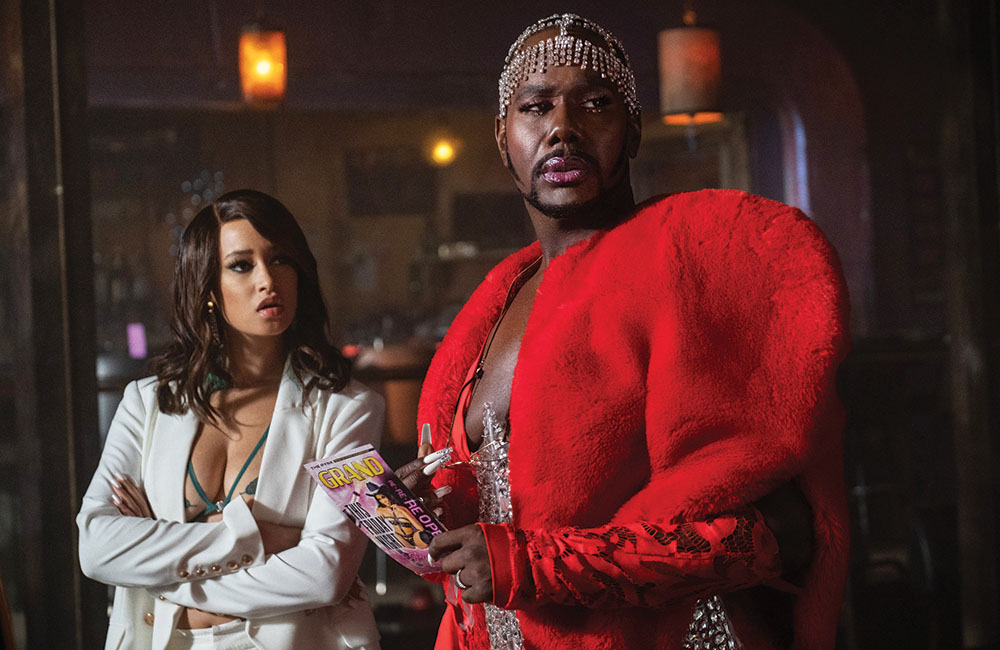
Nicco Annan with Elarica Johnson in a scene from season two of P-Valley.
Courtesy of Erika Doss/Starz

Nicco Annan was working as a dancer, choreographer and stage actor without any major credits to his name when he was invited to audition for a role in future Pulitzer Prize winner Katori Hall‘s play Pussy Valley through a mutual friend. The role, a nonbinary, flamboyant strip-club owner named Uncle Clifford, would call upon Annan’s training in movement and theater as well as his own relationship with his queerness.
Annan, though, had to re-audition for the part when the play was adapted as the Starz series P-Valley. He won the role a second time, and in the show’s debut 2020 season, his character (who uses she/her pronouns) fought to maintain ownership of Mississippi strip club The Pynk while engaging in a tumultuous love affair with up-and-coming rapper Lil Murda. The portrayal garnered him Indie Spirit and NAACP noms. With P-Valley back for a second season as of June 3, the Detroit-raised actor spoke about playing a character, still rare on TV, who is “equal parts” masculine and feminine.
How did you come across the script for the play Pussy Valley?
[Hall] said, “I’m looking for this person that can play this non-binary character. And my friend Dominique said, “Oh, I think you should think about Nicco.” Ultimately, we were just in her apartment. She had five pages. This was the stage direction: “Emerging from the shadows, Uncle Clifford, equal parts masculine and feminine, eyelashes like butterfly wings and nails like talons.” I was like, that’s such a dope description. You know, it wasn’t your typical Nicco Annan was working as a dancer, choreographer and stage actor without any major credits to his name when he was invited to audition for a role in future Pulitzer Prize winner Katori Hall‘s play Pussy Valley through a mutual friend. The role, a nonbinary, flamboyant strip-club owner named Uncle Clifford, would call upon Annan’s […]: “Uncle Clifford. 30. Black. Gay.”
What was the process like of re-auditioning for the series?
I had learned so much about Uncle Clifford along the way. And I had learned how people can misinterpret her. So for me, I didn’t go into it with the mindset of, “I have to prove something to you.” I went in with the mindset of, “Let me show you who she is.”
What is it like to see a character like Uncle Clifford onscreen?
You have the span of the LGBTQ community, right? But then not all of us in all of the communities get that [same] level of representation. And the Black, Southern, gay or trans experience is different.

Nicco Annan with Elarica Johnson in a scene from season two of P-Valley.
Courtesy of Erika Doss/Starz
At first, it wasn’t made clear that Uncle Clifford would want to use she/her pronouns. Is it correct that that was discovered in the process?
That is correct. From the very beginning, from the workshop. And then when we got to production of the play, that was something that was clear. As an actor, when you’re working with the director in workshops, and the writer, et cetera, especially for writers, it’s an opportunity to really get in there and try different things. We would get new pages at lunch, and try this. And [Hall] was able to really stretch to see how much the language can support this world. So there are times where the characters will have elevated text, and poetry to the way that Southerners speak, because it’s all in metaphor and rhythm and rhyme. So she really likes to highlight all of that stuff.
What has it felt like to receive such a warm reaction to your performance?
I don’t want to sound campy, but it feels like a blessed space. And I say that because coming from New York, being a theater actor, you don’t always get the opportunity for your work to reach as many people. There were times doing off-Broadway, doing regional theater, where my parents [said], “Oh, don’t worry, one day, you’ll make it.” And I was confused because to me, I had left Detroit, I had made it in New York, I was living on my own, doing what I love to do. I didn’t know what [their] version of “make it” was. Because they didn’t see it. And now from being on season one, and the anticipation [of what’s to come] … it’s a blessed space.
Can you talk a bit about your relationship to queer nightlife, since this show focuses on clubs so specifically, with Pride month happening now?
Coming out of COVID, nightlife, I don’t even know what it is anymore. I lived all of my 20s in a club. I grew up, I had my 20s in Manhattan and Brooklyn, New York. So it was all about The Octagon, The Warehouse, Langston. Those were my stomping grounds. I miss those days. Sometimes I feel like nightlife for our community can be like church. It’s such a gathering. I want to go around and I want to go to some different Prides this year, because it’s been so long. But you know, now I do get a little crazy around all the heavy, heavy crowds. I’m still wearing my mask. I can’t even imagine going to certain raves and stuff like that. I don’t do that much anymore. But I’m here for it. I think that we need to celebrate. We made it. We are still here.
Interview edited for length and clarity.
A version of this story first appeared in the June 8 issue of The Hollywood Reporter magazine. Click here to subscribe.